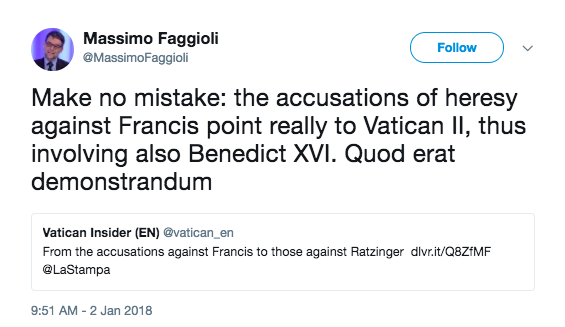This "narrative" that Faggioli deprecates is, of course, exactly that of Antonio Livi, the Italian philosopher whose book review, L'eresia al potere (Heresy In Power), we translated and examined a couple of days ago. Livi, reviewing the new book by Enrico Maria Radaelli, Al cuore di Ratzinger. Al cuore del mondo (At the heart of Ratzinger, at the heart of the world), makes the irrefutable--because so obvious--case that Ratzinger, far from being "a providential bulwark against what he himself called the dictatorship of relativism," was (with Wojtyla) in effect a Great Enabler of Modernism in the Church in the decades that followed Vatican and throughout his own papacy:
... the theology that Ratzinger has always professed and which is found in all his writings, even those that he signed as Benedict XVI (the three books on 'Jesus of Nazareth' and sixteen volumes of 'teaching'), is not substantially different from the theology of his 'Introduction'. It is a theology of an immanentist stamp [which is to say, it is fundamentally opposed to all Catholic thought], in which all the traditional terms of Catholic dogma remain linguistically unchanged but their meaning has changed: the conceptual framework of Scripture, of the Fathers, and of the Magisterium have been set aside ...
The reality is that neo-modernist theology, with its clear heretical drift, has gradually assumed a hegemonic role in the Church (in the seminaries, in the pontifical universities, in the doctrinal commissions of the episcopal conferences, in the dicasteries of the Holy See), and from these positions of power has influenced the themes and the language in the different expressions of the ecclesiastical magisterium, and this influence infected (in various degrees, naturally) all the documents of Vatican II and many of the teachings of the Post-Conciliar popes ...
Faggioli has a point, of course. Bergoglio's theology is in essentials that of Ratzinger and that of the major innovative documents of Vatican II. Indeed, Ratzinger's longtime secretary, Georg Gaenswein, has publicly confirmed this essential identity of theological views and even labeled those who sought to find distance between the two as "stupid people." Faggioli may think that his narrative is a winning one--framing it as "Francis and Vatican II against all others," but I would suggest that this reading of the signs of the time is being done through rose colored glasses. There is a spirit abroad that is finally open to a reassessment of the historical record, that sees the destructive intent of Bergoglio and is determined to get to the source of it all. I think Faggioli is mistaken in his assessment of the devotion the Catholic faithfull feel to a Council that most of them know nothing about.
UPDATE: On 3/12/18 I posted the following comment on another blog, noting that Ratzinger himself had personally confirmed my contention, above:
The Good News keeps coming hot and heavy today: Pope Benedict XVI: There is continuity with Pope Francis’ Pontificate. B16 wrote a letter re a new series of 11 books on the theology of Francis (yes, really) in which he (B16) expressed the view that
“Pope Francis is a man with profound philosophical and theological formation and [these books] are helpful to see the interior continuity between the two pontificates, even with all the differences in style and temperament.”
This has been my view all along–the differences are differences of style, not of real substance. That’s why I wrote a series of blogs re Ratzinger’s heresy in January, including a translation of Antonio Livi’s review essay on “Heresy in Power.”

No comments:
Post a Comment